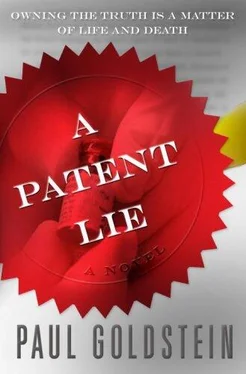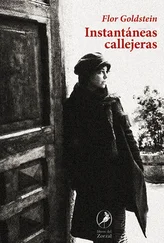Paul Goldstein - A Patent Lie
Здесь есть возможность читать онлайн «Paul Goldstein - A Patent Lie» весь текст электронной книги совершенно бесплатно (целиком полную версию без сокращений). В некоторых случаях можно слушать аудио, скачать через торрент в формате fb2 и присутствует краткое содержание. Жанр: Криминальный детектив, на английском языке. Описание произведения, (предисловие) а так же отзывы посетителей доступны на портале библиотеки ЛибКат.
- Название:A Patent Lie
- Автор:
- Жанр:
- Год:неизвестен
- ISBN:нет данных
- Рейтинг книги:3 / 5. Голосов: 1
-
Избранное:Добавить в избранное
- Отзывы:
-
Ваша оценка:
- 60
- 1
- 2
- 3
- 4
- 5
A Patent Lie: краткое содержание, описание и аннотация
Предлагаем к чтению аннотацию, описание, краткое содержание или предисловие (зависит от того, что написал сам автор книги «A Patent Lie»). Если вы не нашли необходимую информацию о книге — напишите в комментариях, мы постараемся отыскать её.
A Patent Lie — читать онлайн бесплатно полную книгу (весь текст) целиком
Ниже представлен текст книги, разбитый по страницам. Система сохранения места последней прочитанной страницы, позволяет с удобством читать онлайн бесплатно книгу «A Patent Lie», без необходимости каждый раз заново искать на чём Вы остановились. Поставьте закладку, и сможете в любой момент перейти на страницу, на которой закончили чтение.
Интервал:
Закладка:
Their father could arrive home at any moment, and Seeley thought quickly. Outside it was still twilight, but even if the neighbors had gone indoors, the narrow backyard offered no place to hide the revolver. There was the shadowy cellar where his father spent long hours drinking beer and working on his hunting and fishing gear, but the man knew every spider-filled corner of the place. The living and dining rooms were hopeless: the sofa and easy chairs, covered in stiff transparent plastic, were impenetrable and the cabinet with his mother's collection of porcelain figurines was mostly glass. The two small dressers in the boys' bedroom were the first place his father would look. It seemed odd to Seeley that a house so filled with secrets should have no hiding places.
When Seeley opened the pickle jar and carefully shook the coins and currency onto the table, Lenny misunderstood. “Take the jar! You can have it! Just get rid of the thing.”
On his own forays into his father's bedroom dresser, Seeley had examined the revolver more than once. The grip and barrel now appeared shorter than he remembered and, in proportion, the trigger and guard seemed outsized. For some reason that difference now underlined for him the weapon's deadliness. He pressed open the cylinder and, one by one, inserted the six loose cartridges. The smooth movement of the parts-he clicked the cylinder back into place-was almost comforting in its precision. He quickly covered the bottom of the jar with coins, placed the revolver in the center of them, and distributed the rest of the money on top of the revolver and around it. He screwed the top back onto the jar. The hard black crumbs he gathered up from the bedcover and dropped in the wastebasket. Even if his father were to look there, drunk as he was by the time he got home, he would not connect them to the missing gun.
Seeley examined the jar doubtfully before returning it to its corner in the closet. “I'll toss the gun on the way to school tomorrow.”
Leonard said, “Maybe he won't come home.”
That was Lenny's fantasy, but Seeley had his own version. At around this time, the U. S. Justice Department had, with much publicity, initiated the prosecution in nearby Cleveland of a local autoworker for fraudulently entering the United States by failing to disclose that he had been an SS guard at two death camps in Poland. It took no great forensic leap for Seeley at age fifteen to conclude that Lothar Seelig, also an autoworker and immigrant, had himself been an SS camp guard. Surely the brass key in the carved box would unlock the incriminating evidence. Some day, like the Cleveland autoworker, neither of the two madmen would come home.
One sitcom had replaced another on the television when a slamming door shook the house. Seeley's mother must have come into the kitchen because his father's ancient tirade-booming, guttural, unforgiving-at once filled the house with its complaint of incompetence and betrayal. The sentences had lost their meaning long ago, but the fact that the words were English, not German, momentarily loosened the knot in Seeley's chest. When his father spoke English in the house it meant that his drinking had not yet carried him past the last edge of decency.
There was a heavy thump and again the house shook. From experience Seeley knew that his father had hurled his mother against a kitchen wall. Her cry, if there was one, was drowned out by the television. There was a long silence before the heavy boots staggered down the hallway, stopping at the closed door behind which, Seeley on his bed, and his brother at the card table, neither breathed nor moved. The boots turned into his parents' bedroom. Lenny started shaking and, though terrified himself, Seeley was astonished to discover, peeking out from some corner of his soul, a spark of mischief, even glee, anticipating the roar of the dumb, confounded beast pawing through drawers of socks and underwear as he discovered that his gun was gone.
Drawers opened and slammed shut in the next room. Then, as Seeley expected, the mindless, anguished cry. Wo ist es? Wo ist mein Revolver?
The door to the boys' room swung open-the latch had broken long ago-and the massive figure, all chest and gut, a blown-up version of the boys' pantomime monster, crashed in, the fierce stench of alcohol filling the room. He didn't ask who took the gun. The bloodshot eyes that locked onto Seeley's announced that he had already been convicted of the theft. Wordlessly, his father ripped one drawer from Seeley's dresser, then another, flinging them against the wall, before doing the same with Lenny's. Ignoring Lenny, who was frozen in his chair, the monster seized the table by a leg and flipped it over. The wastebasket he flung against the wall, and black shards rained onto the floor. He didn't notice. Pants, shirts, jackets, followed by wire hangers flew from the closet. The monster again turned to Seeley and glared at him.
To avoid the man's gaze, Seeley's eyes swept past Lenny and the telltale closet, fixing instead on the ocean scene that decorated the wallpaper directly opposite his bed. Against a blue-gray ground, horizontal rows of sailboats alternated with parallel rows of tropical fish. The sailboats were the same color as the sea, separated only by a thin red outline tracing the hull and sails. The fish bore pastel stripes and spots, but, like the boats, were otherwise transparent to the color of the sea. Improbably, the fish were three times the size of the boats. The gross unreality of the images cemented Seeley's terror, as if the fact that these forms could coexist on his bedroom wall implied that any horror was possible; that in this house so rarely visited by outsiders, anything could happen.
The gun's discovery was inevitable. The house was too small, the furnishings too spare, to hide the smallest secret from this man's rage. As if reading Seeley's thoughts, his father swung back to the closet. For an instant, the single swiping movement of his boot threw him off balance but then shoes and sneakers hurtled out into the room. Bracing his bulk against the doorframe, the man leaned in and brought out the squat glass jar. He twisted off the top and, staggering across the room, emptied the jar onto the foot of Seeley's bed. Propped against a pillow, Seeley watched as his father pawed the coins, quickly uncovering the revolver. With a startling delicacy, he lifted the gun so that the scarred weapon rested in his palms. He could have been cradling some small injured animal.
Beneath Seeley's pounding blood, the perverse sense of mischief peered out again, taunting. “ Lo thar,” Seeley said. His brother shot him a horror-stricken look. “ Lo thar,” Seeley said again.
If his father heard, he gave no sign. “This is what you do to my possessions?” The voice was heavy with alcohol. “The man, your father, who gives you a roof over your head”-he aimed a thick finger at the ceiling-“who feeds you? This is how you repay me? Dolchstoss! A stab in the back!”
A hand the size of a baseball mitt seized Seeley by the collar, and he didn't resist when it pulled him off the bed, onto his feet. The fl at of his father's hand propelled him through the door and down the narrow hallway, the tip of the gun barrel pressed into Seeley's skull, behind his ear. Lenny remained in the bedroom. He must have pried himself from the chair because Seeley heard the door close behind him.
“Let's show your mother what a fine son she bore me.” They were in the kitchen, where Seeley's mother had pressed herself against the far wall. On the stove, a pot boiled violently and the evening's dinner congealed in its roasting pan. As in the bedroom, the raw smell of alcohol filled the room. Formerly a student of wallpaper, Seeley now fixed on the television screen. Two women his mother's age, but elegantly dressed, chatted amiably in a stage-set living room.
Читать дальшеИнтервал:
Закладка:
Похожие книги на «A Patent Lie»
Представляем Вашему вниманию похожие книги на «A Patent Lie» списком для выбора. Мы отобрали схожую по названию и смыслу литературу в надежде предоставить читателям больше вариантов отыскать новые, интересные, ещё непрочитанные произведения.
Обсуждение, отзывы о книге «A Patent Lie» и просто собственные мнения читателей. Оставьте ваши комментарии, напишите, что Вы думаете о произведении, его смысле или главных героях. Укажите что конкретно понравилось, а что нет, и почему Вы так считаете.












